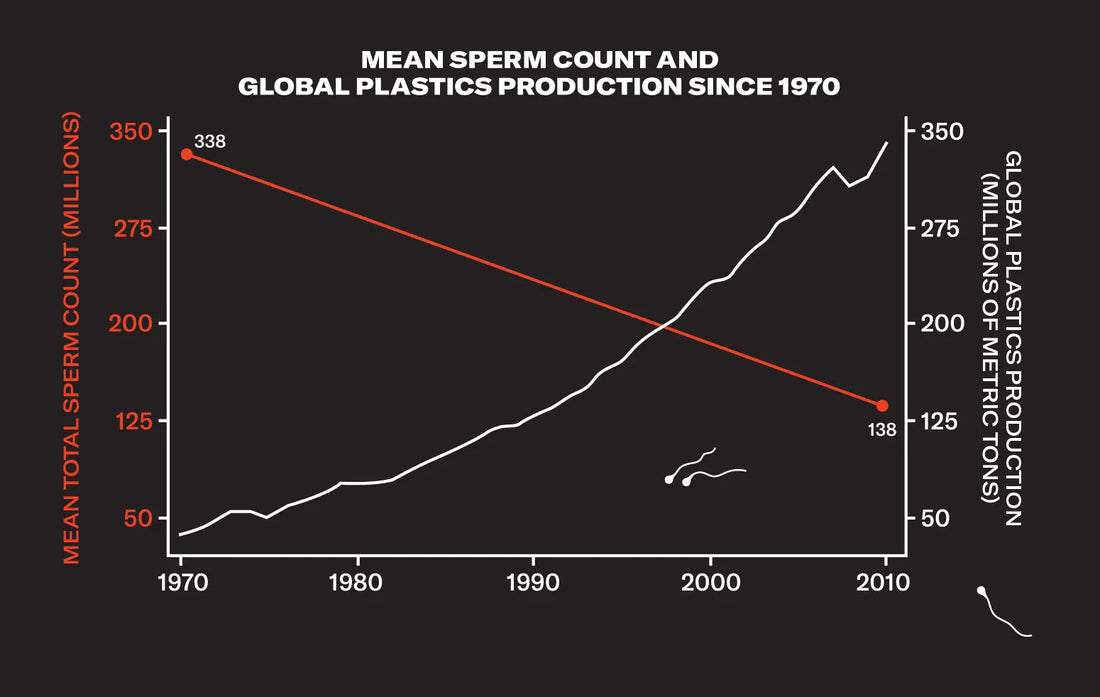A strange phenomenon has occurred in recent decades; Men are becoming increasingly infertile! It's so bad that we may not be able to reproduce within one generation.
A study from the University of Mount Sinai found that men's sperm count has dropped by 50% in the past 40 years. That means: we are half as fertile as our grandfathers...
The sperm count fell from 99 million per milliliter in 1973 to 47 million per milliliter in 2011. Does this mean that in 40 years we will be at 0...?
What's causing this mysterious drop in fertility? And is there a way to turn the tide?

Then why didn't we notice this?!
Most men can still conceive a child naturally, and those who cannot have a fertility treatment industry ready to help them. Fewer children are indeed being processed, but this is also due to the fact that people start this later and choose to have fewer.
Why is this dangerous?...
..Because this poses major health risks! Sperm production is the engine of the male body. There is a clear correlation between men with poor sperm quality and diabetes, cancer and heart disease.
Testosterone levels have also fallen sharply. This results in smaller testicles and therefore less fertility. "What you see is that the sexual differences decrease," says Dr. Shanna Swan. Men are less masculine.
But how is this possible?
“A chemical revolution has been going on since the early 19th century,” says Anna-Maria Andersson. 'And it increased explosively after the Second World War, when hundreds of new chemicals came onto the market. This entered our bloodstreams and no one knew the consequences. We became a living experiment.
When a chemical affects your hormones, it is called an endocrine disruptor. And it turns out that many of the compounds used to make plastic soft and flexible (like phthalates) or to make them harder and stronger (like Bisphenol A, or BPA) are excellent endocrine disruptors. Phthalates and BPA, for example, mimic estrogen in the bloodstream. If you are a man with high levels of phthalates in his system, you will produce less testosterone and less sperm. If a male fetus is exposed to phthalates in the womb, its reproductive system itself is changed: it will develop less masculinely.
The problem is that these chemicals are everywhere. BPA can be found in water bottles, lunch boxes and receipts. Phthalates are even more common: they are found in medical devices, cleaning products, packaging, paint, cosmetic products, etc.
So, we all have it in our bodies. And these chemicals are passed down from generation to generation.
Women with elevated levels of phthalates in their urine during pregnancy were significantly more likely to have sons with smaller testicles. “When the [fetal] testicles start producing testosterone, about week eight of pregnancy, they produce a little bit less,” Swan said. "That's the essence of this whole story. So phthalates reduce testosterone. The testicles then don't produce proper testosterone.
And.. how do I prevent this..?
What you can do is the following:
- Filter your tap water (Reverse Osmosis)
- Eat unprocessed food (buy organic from the farmer)
- Stimulate natural testosterone production through sport & exercise
- Supplement from nature: Vitamin D, Zinc & Magnesium
- Balance your hormones Tongkat Ali & Maca

